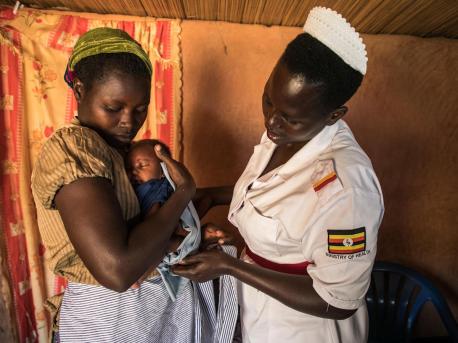
Thank a Nurse Today
Since the start of the COVID-19 pandemic, health professionals have stepped up bravely to protect the rest of us — despite unprecedented overwork and an alarming shortage of protective clothing and coronavirus tests. In the U.S., at least 9,200 front-line nurses and other medical personnel had contracted COVID-19 by mid April, according to the Centers for Disease Control and Prevention. Federal and state agencies report that dozens of nurses and other caregivers have died, and that number is thought to be only a fraction of the total.
As the novel coronavirus circles the globe, nurses are not only fighting the pandemic, they're also continuing to care for newborn babies, immunize children against vaccine-preventable illness, treat severely malnourished kids and more. Nurses are the backbone of health services worldwide.
"Today, we are more deeply grateful than ever to all of you, as you work, round the clock, putting yourselves at risk, to fight the ravages of this pandemic," United Nations Secretary-General António Guterres said, thanking medical professionals on April 7, World Health Day. Make that every day.
A heartfelt thank-you to the world's nurses. UNICEF won't stop protecting children, and neither will you.

On April 17, 2020 in Italy, doctors and nurses from the obstetrics and the gynecology department at the Hospital of Treviglio, one of the biggest hospitals in Bergamo Province, send a message: "From our delivery room a message of hope, life does not stop." © UNICEF/UNI324962/Diffidenti

A nurse wears a mask and gloves to protect against the novel coronavirus in the health center of Port Bouet, a suburb of Abidjan, Côte d'Ivoire on April 1, 2020. © UNICEF/UNI316681// Frank Dejongh

Aminata Cissé, left, traveled 83 miles from her hometown seeking treatment for her daughter, Maya, 12 months, who was suffering from severe acute malnutrition, malaria and anemia. "I was scared of losing her," Aminata said. "She was sleeping all the time and she wasn't playing. She didn't even have the energy to cry." Moulidi Cissè, right, a nurse at the regional hospital in Timbuktu, Mali, treated Maya with therapeutic milk, two blood transfusions and medication to fight malaria. By March 11, 2020, after three days of treatment, Maya had already gained a pound. © UNICEF/UNI313316/Coulibaly

Even during a global pandemic, children need to be immunized from vaccine-preventable diseases. A nurse from the Hoti ethnic group vaccinates a child at the ambulatory health care center of the community of San José de Kayamá, Bolivar, southern Venezuela on February 21, 2020. UNICEF chartered a light plane to reach 1,300 children living in the remote region with needed doses of polio, yellow fever and measles vaccines. © UNICEF/UNI323811/Pocaterra

"I like my job a lot because I love helping my people, and in particular children," says Lillian Nimaya, 45, who has been working as a nurse for the past 5 years at the UNICEF-supported Nyakuron primary health care center in Juba, South Sudan. Every day, Nimaya gives children the routine immunizations they need to stay healthy. "We inform the mother when they are pregnant that they should vaccinate their children, and we repeat the same message after they have given birth," she says. "You often hear me saying sorry to the children when I'm giving the jab, because I know it hurts. But I also know that this will protect them from dangerous diseases." © UNICEF/UNI317162/Ryeng

Kabusinge Madrine, a nurse midwife at Kawempe Referral Hospital in Uganda, holds newly delivered twin girls, Babirye and Nakato, on January 1, 2020. "There is a procedure called resuscitation," Madrine says. "A baby is born and there is no life, and even the mother has lost hope, so bringing the baby back to life is the best part of my job." © UNICEF/UNI261026/Abdul
Top photo: A UNICEF-trained nurse midwife helps 28-year-old Lucy Atikoru wrap her baby close to her body at the Omugo Health Center in Uganda on December 19, 2019. © UNICEF/UNI313225/Abdul
HOW TO HELP
There are many ways to make a difference
War, famine, poverty, natural disasters — threats to the world's children keep coming. But UNICEF won't stop working to keep children healthy and safe.
UNICEF works in over 190 countries and territories — more places than any other children's organization. UNICEF has the world's largest humanitarian warehouse and, when disaster strikes, can get supplies almost anywhere within 72 hours. Constantly innovating, always advocating for a better world for children, UNICEF works to ensure that every child can grow up healthy, educated, protected and respected.
Would you like to help give all children the opportunity to reach their full potential? There are many ways to get involved.



